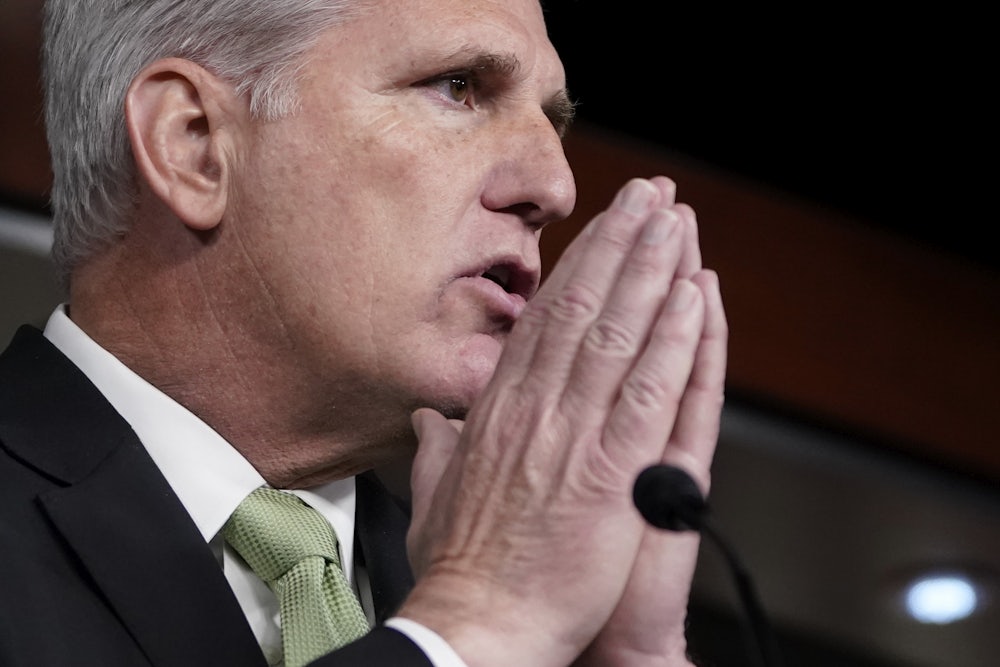“The Colonial Pipeline crisis shows that we need more American energy to fuel our economy, not less.” So tweeted Minority Leader Kevin McCarthy, shortly after a cyberattack prompted Colonial to shut down a pipeline serving huge chunks of the East Coast. McCarthy chided the Biden administration for canceling the Keystone XL pipeline and “leaving our energy supply more vulnerable to attacks.”
“The cyberattack and shutdown of Colonial Pipeline serves as a stark reminder of the need for more pipelines to ensure Americans have access to affordable, reliable energy.” So tweeted Mike Sommers, CEO of the American Petroleum Institute, a trade lobby for oil and gas companies.
These responses are remarkably similar. Of course they are: According to available Federal Election Commission data, Sommers—the anointed mouthpiece for the American fossil fuel industry—has donated to just three candidates this year. Among them is Kevin McCarthy. On January 15, he gave $5,000 to the McCarthy Victory Fund and $2,800 directly to the California congressman’s reelection campaign.
In reality, the East Coast faced gas hysteria this week because a company with notoriously bad cybersecurity and pipeline monitoring software—and multiple record-breaking spills to its name—got hacked, and shut down gas flow rather than risk being unable to bill customers effectively. But the fossil fuel industry’s implausible spin on this story appeared almost immediately, and quickly percolated up into the Republican Party: The industry is committed to working with government on cybersecurity, and needs even more pipelines to protect American Energy Independence and keep things like this from ever happening again. Insofar as there’s anyone to blame for this week’s disaster, it’s Democratic climate policy that has not yet passed Congress. This was the message behind Sommers’s absurd rhetorical pivot on CNN on Thursday: “We need of course to take care of cybersecurity,” he said, “but we also need to protect existing infrastructure from attacks from regulators and government officials who want to shut these pipelines down.”
That Republicans sound like fossil fuel lobbyists speaks both to the ubiquity of oil money in politics and a profound lack of creativity on the part of the GOP. But the Colonial Pipeline episode—like the Texas energy crisis before it—shows just how central enlisting lawmaking deputies is to the fossil fuel industry’s business model.
The fossil fuel industry is effectively a public-private partnership. It depends on generous subsidies in the form of long-standing tax breaks and preferential leasing, but also on all manner of infrastructural support and diplomatic maneuvering to make the world friendly to U.S. fossil fuels. The concept of energy independence is itself the result of dedicated, state-led industrial policy first unveiled by the Nixon administration in the wake of the 1973 oil crisis, meant to boost domestic energy production. Even the ownership of the Colonial Pipeline itself shows just how much public capital makes oil flow. Shell and Koch Industries are both major owners, alongside private equity firms. Yet also behind the pipeline are companies that manage public pension funds in Australia and Quebec, as well as South Korea’s state-run National Pension Service.
If “energy independence” were McCarthy’s real concern, it would make sense for him to favor temporarily halting fuel exports, which he instead wants to expand. It would make sense for him to urge refinery operators to invest more in being able to process the light, sweet crude flowing out of the Permian Basin. Needless to say, the Midwestern Keystone XL pipeline expansion McCarthy and other Republicans have used the cyberattack to pitch would not have either prevented a ransomware attack or alleviated fuel shortages among the East Coast gas stations the Colonial Pipeline supplies.
While the industry has cast just about any climate policy as a radical intervention into the economy, most of what Democrats have proposed so far amounts to either withdrawing some small portion of the mountains of state support oil companies currently enjoy or providing similar, much more modest benefits to the clean energy sector. The fossil fuel companies have trained plenty of attack dogs to make their case.
Representative Jim Jordan, who has received $287,800 from energy and natural resource company PACs since coming to Congress, tweeted that, “In four months we’ve gone from energy independence to lines to get gas.” Referring to a “gas crisis,” Senator Ted Cruz—who has gotten $426,500 from the same grouping of PACs as a senator—said, “Welcome to the Green New Deal.” Lobbyists have been making the rounds this past week in search of further handouts—now looking to make claims on upcoming infrastructure legislation. “Anytime you’re talking about infrastructure legislation, whether you’re talking about bridges or highways or roads,” API’s Frank Macchiarola said recently, “you have to talk about pipelines.”
Republicans and the fossil fuel executives who fund them are in a tricky spot here. The hackers’ attack highlighted the fact that fossil energy—dependent as it is on big centralized generation and arteries for transportation—is riddled with chokepoints that can be cut off by in-person or digital monkeywrenching with any range of motives. While the grid itself is certainly in need of hardening and transformation, rooftop solar and microgrids—which can supply power independently of the grid if need be—are far more resilient against the sorts of attacks that felled the Colonial Pipeline. A rapid rollout of electrified public transit and electric vehicle charging stations that relied on such sources would make the kinds of shortages plaguing East Coast gas stations this week a thing of the past.
As Biden meets with Republican senators this week to hash out details on infrastructure, they’ll no doubt bring their fossil fuel donors’ anxieties into the room with them. Biden should know better than to take their bait.








